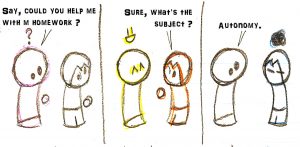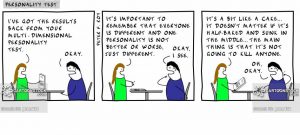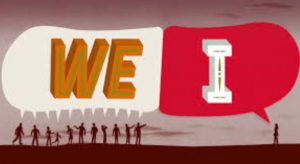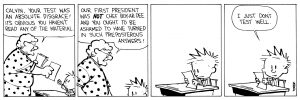Blog 9
The things I have found the most interesting in our blog posts have probably been the blog posts where I was able to talk through and learn more about the Social Determination Theory, Kohlberg’s Theory of Morality and talking about gender roles in fairy tales. Kohlberg’s Theory of Morality was something that we talked about in my ethics class and it’s interesting to view that theory in relation to other moral or ethical theories such as the theory of Utilitarianism. This is the theory that the good or moral thing to do will always be the thing that causes the best utility or what causes the greatest happiness for the most people in a society. This idea is probably more in line with someone who is the conventional moral development stage where they can rationalize that this is the best course of action because they will not be ostracized. Unfortunately just because something is popular, doesn’t mean that it is the best or most moral thing to do.
I have also thought about the Social Determination theory when in my diversity issues class. One way to think about different diverse issues is by looking at the background of many societies.
Blog 8
I think fairy tales very well can reflect the shared cultural norms and values of a culture at that specific time. You hear stories about folk lore being passed on from generation to generation and how the stories can change over time. The fairy tale being discussed in the article we read was the tale of Beauty and the Beast. The basic structure of this story has been around for centuries, since the story was written in 1740 by French novelist Gabrielle-Suzanne Barbot de Villeneuve. It has since been told through different mediums and by different cultures. The modern adaptational film that was released earlier in the year keeps it’s French roots, but updates it for modern times. It would probably be almost unrecognizable to Villeneuve that Belle is the inventor, instead of her father, and that Gaston’s sidekick is, in fact, queer. It is a reflection of how we as a society have modernized and evolved. The story though does keep the plot point of Belle falling in love with the beast and then the beast having a dramatic showdown Gaston at the end as they fight over the damsel. So not everything has been changed and true gender equality has not been reached in the story or even in our modern cultures. But, hey, there’s still time to adapt for the next generation.
Even the way we hear and tell stories nowadays has adapted. A child may first hear the story of Little Red Riding hood, not through a book or as passed down folk story told by a relative, but instead the child first may come across the story by watching a youtube video on a tablet, while traveling in a car to school. And Goldie Locks, for example, may be a baker who owns her own bakery and is traveling to visit her grandmother. She may not need the woodsman’s help but may in fact be able to save herself. As we evolve as a cultural so does our story telling and the stories we tell.

————————————————
Blog 7
When discussing the self determination theory, we look at three aspects of culture- autonomy, competence, and relatedness, that people from all cultures share.
I think I am a pretty autonomous person when it comes to my academics, especially in relation to people in my life, like my best friend. She is Hindu and her dad is from India. When reading about collectivistic vs individualistic cultures, I immediately thought of her. Her dad was born in India and she has always had a pretty close knit family who actively take a role in helping her to make decisions. For example, I remember during senior year of high school, when we were picking out which colleges we wanted to attend, her parents had big role in helping her decide Virginia Tech and actively encouraged her to get a degree in business so that she could eventually work for the family business when she graduated. My parents on the other hand, wanted me to make the decision for my self regarding my future. It doesn’t necessarily mean that my friend isn’t autonomous, she may just have been more passively motivated then I was, and but this is an aspect of her culture that she does not seem to mind.
When it comes to competence, the more competent I feel in what I am studying, the better and more engaged and motived I am to do well. This was certainly something I realized when I initially started undergrad and decided I wanted to be a Political Science/ Pre Law student who would then go on to Law School. But my political science classes just were not engaging me and I didn’t do as well as I wanted. Instead, I would rather be with my friends then study or read for a class. This caused me to take a couple year break after my junior year to try and find out what I wanted to do. Since returning to school and changing my major, I have felt more competent and more motivated then I ever did before.
With relatedness, I can say that having my family’s support and encouragement with coming back to school has made a big difference. My parents never pressured me to return back, instead, knowing that I needed to figure things out on my own, acted as a sounding board for my frustrations but never tried to make decisions for me. They gave me the support I needed to make mistakes and correct them on my own.
These three aspects have been met academically and caused me develop my own academic personality and to grow at my own speed.

——————————————————
Blog 6
So this week we took a personality test called the NEO test. This test was comprised of 60 self reflection questions that had the testee rate themselves on a 5 dimension scale that had the options of strongly agree, agree, neutral, disagree and strongly disagree. The NEO test would then grade your answers and score you as high, average or low on 5 areas: Openness, Conscientiousness, Agreeableness, Extraversion, and Neuroticism. My scores were as follows: Very high (51) on neuroticism; Average (26) on extraversion; Average (28) on openness; High on Agreeableness; And very low (22) on conscientiousness. While I found some descriptions closely mirrored how I see myself, I also disagreed with a few. I do believe that I am a sensitive person who is prone to being overly emotional so I found my neuroticism score spot on. I also agree that I’m probably pretty average when it comes to extraversion as I do enjoy being around people, new and old, but I also like my alone time. I do think I can be overly stubborn sometimes, so I was surprised my agreeableness grade was so high. I also consider myself pretty dependable when it comes to friends, family or jobs so my conscientiousness score surprised me, but I think my tendency to be a bit disorganized at times probably dragged the score down.
Tests like these can be quite useful. It’s important to our own self concepts that we are able to differentiate our personal identity from our collective identity and relational identity, but also see how they relate to each other. I tried to be cognizant as I answered the questions that I was answering them by how I see myself and not how I think others, such as friends or work colleagues may view me.

———————————————————-
Blog 5
It’s important to have a healthy grasp on your own self concept and where certain factions of that concept originate from. Our cultural worldview help us reflect on how we see ourselves in society and thus how we view ourselves. For this assignment we had to write ten statements about statements about ourselves starting with the phrase “I am…” and then fill in the blanks. From dissecting my ten statements, I would have to put myself in the category of having an interdependent construal of self. Over half of my ten statements of myself, were in the context of the different relations I have around me. I value the role that I play in the lives of my friends, family, co workers and clients. I am aware of the social responsibilities I have as a person in society and strive to be a productive member. As the text book states, this does not mean that I am unaware of my own abilities or personality traits, but that I like to use them in service of those around me. This could be a product of my upbringing. Although Americans are seen as a more individualistic society, I was raised surrounded by a big family and my parents always had an open door policy when it came to having others’ over to the house. I am a social being by nature.

———————————————————–
Blog 4
The first test in a class is always something that makes me a little anxious. Knowing a professor’s test style is a crucial part of test taking for me. I knew that this test would be 50 multiple choice questions, but would the questions be more about definitions, about dates? Would questions focus more on theories or the psychological studies they resulted from? Would it adhere mostly to the review sheet? I chose to study by filling out my review sheet by memory- highlighting any questions I had to skip because or could only partly answer. After that I went through and filled in the responses I could not before and then review from that packet. I don’t think I gave myself enough time to study the information I did not know the best. I started studying too late in the week and didn’t give the focus needed to study all the names of theorists and their theories. This will help me when it comes to studying for our next test to give me more time and to focus more on my problem areas. I may even want to think about making flashcards to match theorists with their theories.

—————————————————
Blog 3
For the Week 4 Discussion board, we were tasked to think about Kohlberg’s Theory of Morality and how this theory relates to our own lives. Kohlberg theorized that there are three general stages of morality: Pre-conventional, Conventional and Post conventional morality. Pre-conventional emphases the punishment/reward aspect of morality. In this stage people are moral because they do not want to be punished or they value the rewards that come with being a moral person. Conventional morality is based on societal expectations. Someone who in this stage of morality conforms to the rules placed by society because they do not want to be ostracized. Post conventional morality is the stage where someone places their morality in the context of their own moral beliefs and needs. This discussion board helps in discerning where my own moral beliefs arise. Generally, I know what right from wrong and tend to follow the rules because I do not want to let down my friends or family by being an immoral person. But, I do have evolving views based on the situation. For example, I know that stealing is wrong and I have never personally stolen anything from a business, but I also understand that someone who is desperate enough to steal because they feel like they have no other recourse (such as the Heinz example in Kohlberg’s study) deserves empathy. This is relevant because to this class because different cultures view morality in different ways. Small things that may not seem immoral in one culture could be immoral to another. It’s important to know why people in these cultures follow rules that may seem harmful.

————————————————————————————————————————
Blog 1
The course objectives for Cross Cultural Psychology listed in our syllabus include:
- “Understand cultural diversity and the impact of culture on human life.
- Develop greater understanding of people from other cultures and skills for successfully interacting with them.
- Develop critical thinking skills and apply them to psychological theory and research that examine the influence of culture.”
Someone’s culture can have a profound affect on their life; culture affects not just the decisions we make, but also how we interact with others. Culture can affect what we determine as normal or abnormal behavior. Culture can affect how we as a society divide up resources, how we treat the environment and how we obtain vitals basic human needs.
I am hoping to one day work in the counseling field. I am currently taking the class Human Services Methods as part of my human services minor. One of the first facts we learned on the very first day of that class was that multicultural competence of a counselor is one of the biggest predictors of a client’s counseling satisfaction. This is important. I will hopefully one day be lucky enough to work with clients of all different cultures, personalities and backgrounds. In order to better service and help them, I need to understand how to best interact across cultures.
This means learning not just about other cultures, but also how my own culture can shape my identity and build my view of the world. It would be pretty self-involved to think that every person I work with will share my thoughts, ideas and views. So by learning more about cross cultural psychology, I can learn more about myself and how my different cultural biases could affect the way I interact with others. This can only make me a better human services professional if I am able to confront those biases and learn to become more multiculturally competent.

